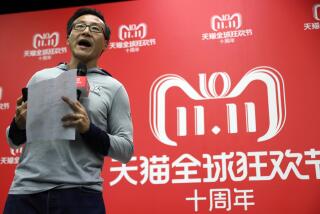Wal-Mart has new setback in China
- Share via
Reporting from Beijing — Wal-Mart Stores Inc. is replacing the head of its operations in China, the latest setback for the U.S. retailer in one its most important foreign markets.
Ed Chan, its chief executive in China since 2007, left the company for personal reasons, according to a statement posted Monday on Wal-Mart’s website. Clara Wong, a senior executive for human resources, also stepped down, the statement said.
The moves follow the arrest of two Wal-mart employees and the detention of 35 others last week in the western city of Chongqing after local officials accused the retailer of mislabling ordinary pork as more expensive organic pork.
Although Wal-Mart did not link the personnel moves to the controversy in Chongqing, the company continues to deal with fallout from allegations that it sold about 140,000 pounds of mislabed pork over the last two years. The added cost to consumers amounted to about $115,000, according to the city government’s website.
News of the violations surfaced last week after local authorities ordered the temporary closure of 13 Wal-Mart locations in the city, arrested two employees and detained an additional 35. The company was also fined $575,000.
The punishment, which some foreign observers considered excessive, was met with acquiescence from Wal-Mart as it apologized for the problems and pledged to correct them.
“We are cooperating with the authorities and are looking forward to exceeding our customers’ expectations when we reopen our stores in Chongqing,” Anthony Rose, Wal-Mart’s vice president of corporate affairs in Asia, said in an email to The Times on Monday.
This is not the first time Wal-Mart has run afoul of the law in China. The retail chain has been fined by regulators on several occasions, including an incident involving the sale of duck in Chongqing after its expiration date.
In February, Wal-Mart and French chain Carrefour were fined a total of $1.4 million after they were found to be deceiving customers about discounts and mislabeling prices.
Foreign firms with big stakes in China have little room to fight government charges, as they risk losing hard-won positions in one of the world’s most important emerging consumer markets, experts say.
“Given the absence of any effective recourse to challenge the government’s actions, Wal-Mart has no choice but to engage in a strategy of appeasement,” said James Zimmerman, a partner at the Beijing office of Sheppard Mullin Richter & Hampton and a former chairman of the American Chamber of Commerce in China.
“Fines and apologies are obviously not enough,” Zimmerman said. “Someone needs to fall on the sword before the government declares a victory and releases their employees and allows the reopening of their stores. That’s unfortunate, but that’s China.”
Experts say the government was also probably responding to consumer outrage over rising pork prices and a spate of food safety scandals that have eroded public trust.
The Associated Press reported last week that some see a political connection between the case and Chongqing’s ambitious Communist Party chief, Bo Xilai. The charismatic apparatchik has won approval for taking on the city’s entrenched criminal gangs and could benefit from standing up to a major foreign firm. Bo is believed to be vying for a top position in the central government.
“It’s probably a mixture of political positioning ahead of the leadership transition, with people there [in Chongqing] wanting to be seen as consumer advocates, and also an effort to balance some of the bad press Chinese companies have gotten, to show that they’re not the only ones with problems,” Torsten Stocker, a consumer goods specialist at U.S. consulting firm Monitor Group in Hong Kong, told the Associated Press.
Wal-Mart said it expects to reopen its Chongqing stores Oct. 24, the first day their ordered closures can expire.
The company has expanded aggressively across China since it entered the country in 1996 but has been met with stiff competition from local and European rivals. The company reported $7.5 billion in revenue in China last year, less than 2% of its global revenues.
The Bentonville, Ark., company has hit bumps along the way, including a failed attempt to keep its Chinese employees out of an official workers union and the resignations of its chief financial officer and chief operating officer in China this year.
Unlike in the U.S., where Wal-Mart is seen as a retailer for blue-collar consumers, the chain is regarded as slightly more high-end in China, compared with local grocers and supermarkets.
With 346 locations as of August, China is Wal-Mart’s fourth-largest foreign market and is seen as a key to the company’s growth given the potential for a prolonged slump in the U.S. economy.
“International remains the key growth driver for our company,” Mike Duke, Wal-Mart’s chief executive, said this year.
More to Read
Inside the business of entertainment
The Wide Shot brings you news, analysis and insights on everything from streaming wars to production — and what it all means for the future.
You may occasionally receive promotional content from the Los Angeles Times.











